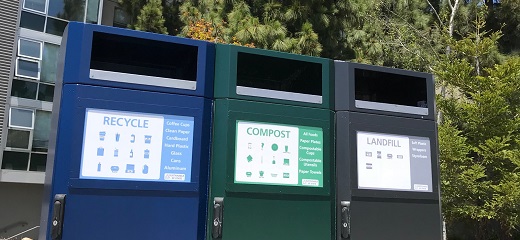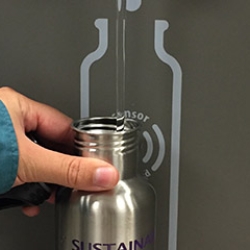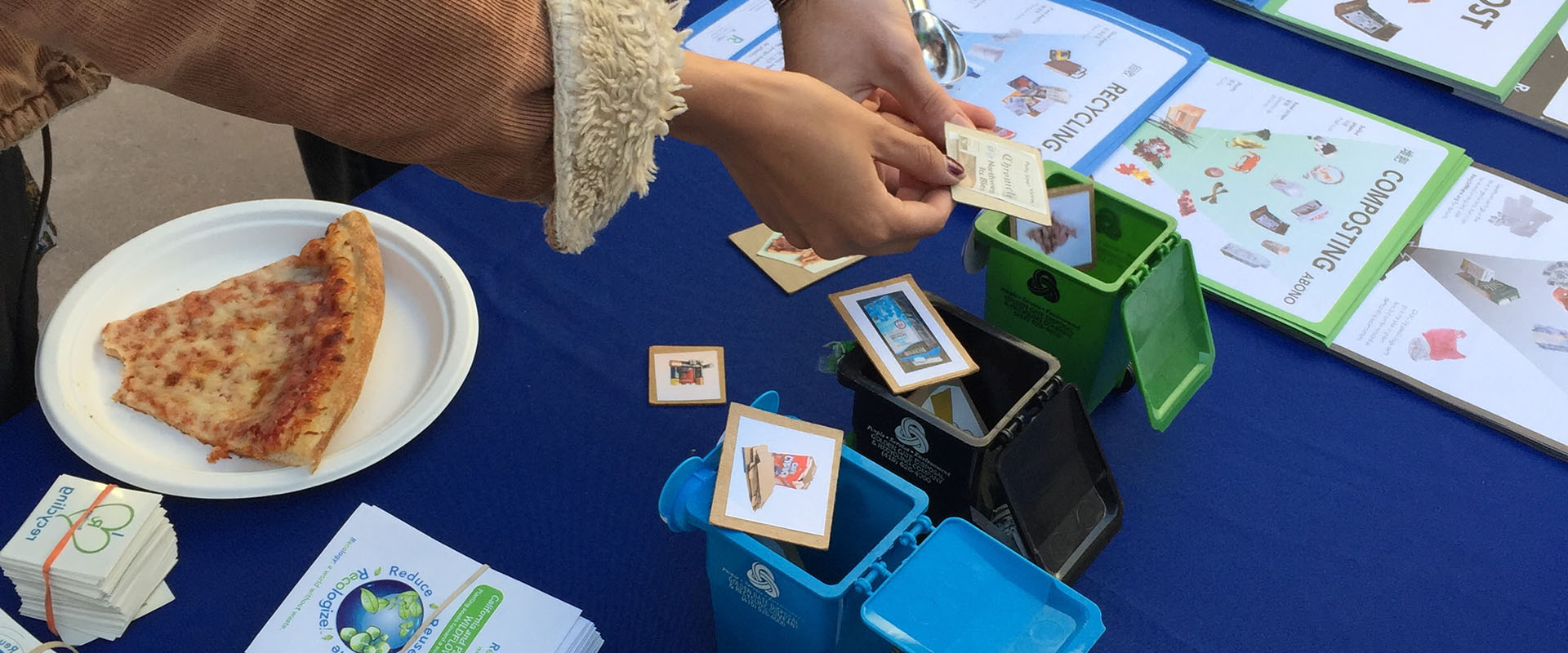We want to create a healthy, low-carbon lifestyle for our San Francisco State community. Producing no waste, using water conservatively and eating sustainably are just a few of the many ways we strive to make SF State the best environment possible.
Working Towards Zero Waste
In 2023, San Francisco State University diverted 72% of its waste from landfill by recycling, composting, donating, or re-selling! Our goal is to become a zero waste campus and we are doing all we can to get there as quick as possible.
3-Bin Compost, Recycle and Landfill System
SF State has standardized the 3-bin waste system to be outside every building on campus. In order to encourage our community to think about the waste they produce and discourage landfill, we are in the process of getting rid of all stand-alone trash bins and 2-bin systems within buildings. By having only 3-bin systems and minimizing the quantity of them, we hope to reduce the cost of waste collection and have our community sort their waste properly. There are now compost bins in every bathroom on campus so paper towels (along with other compostables like food scraps) are properly composted instead of ending up in the landfill. Our new signage clearly shows what goes in each bin.
Find our 3-bin waste signs here so you can have them for your home or next event!
Where Does My Waste Go?
Green bins are compost, blue bins are recycling and black bins are landfill. Here are examples on what goes in each:
- Compost = all food waste (yes, even meat and bones!), used napkins and paper towels, food-soiled cardboard or paper (pizza boxes or non-shiny paper plates)
- Recycling = aluminum/metal, glass, paper, cardboard, hard plastics, juice/milk cartons, all parts of your coffee cup!
- Landfill = soft plastics (plastic bags, plastic wrapping, chip bags, candy/bar wrappers), styrofoam
- Special handling = batteries, clothes/textiles, electronics, furniture, light bulbs
For information on how to recycle and compost, visit sfrecycles.org.
Getting Rid of Unwanted Clothing and Items?
Donate them on campus! Associated Student's Environmental Resource Center has a clothing donation bin located on the main floor of the Cesar Chavez Student Center. All donations are used in their monthly clothing swap where students can donate unwanted clothes and receive clothes they want for free. Check out their Instagram to see when their next clothing swap will be.
There are three Goodwill bins located on campus. You can donate clothing and other accepted items any time on any day! Check out our Sustainable SF State Map to see where the bins are located.
Moving Out?
Every May we have a Sustainable Move Out where Goodwill comes to campus to collect items you no longer need. Everyone can come and donate! Look for the Goodwill truck in the tri-community plaza (next to Monarca Dining Hall) during finals week this upcoming May.
In May 2024, Sustainable Move Out diverted 6,600 pounds of waste from the landfill!

No Single-Use Plastics on Campus
In compliance with CSU Sustainability Policy, SF State is phasing out single use plastic water bottles, plastic straws, polystyrene containers and plastic bags. It is estimated that only 5% of all plastics are actually recycled and the plastics that are recycled are actually "downcycled" -- turned into lesser quality plastics (like park benches) instead of the original product (like water bottles). We want to prevent this waste as much as possible, which is why we are working on building refill infrastructure and encouraging our community to bring their own reusables.
Water Bottle Filling Stations
SF State has installed water bottle filling stations throughout campus to make it easy to ditch single use plastic bottles. Filtered water is available in almost every building on campus. There are dozens of hydration stations located throughout campus where you can refill your reusable water bottle for free. In 2021, an additional 50 touchless hydration stations were built for easy and sanitary hands-free use.

Refill Your Bottle
Help us reduce plastic waste and ocean pollution by using a reusable bottle. Find a water refilling station on campus, buy a reusable water bottle, and more. Take action and start using a reusable bottle today!
Conserving Water
SF State is committed to responsible use of water and the protection of our regional water resources. With our changing climate dramatically increasing droughts and floods in the Bay Area, we are building climate resilience into our campus by having bioswales absorb excess water, rainwater collection and more.
Water Conservation
In order to conserve the amount of water we us on campus, we have several programs in place to limit water usage.
- Centrally controlled irrigation systems that optimize watering
- Reduced watering on selected lawns
- Planting drought tolerant and adaptive landscapes
- Replacing old water fixtures with low flow models
- Leak detection and monitoring
- Ongoing education and outreach
Stormwater Management
SF State also strives to provide protection of San Francisco's stormwater systems by preventing rainfall runoff. Bioswales -- landscape channels that collect and filter rainwater -- are built throughout campus to absorb rainwater and minimizing runoff. Rainwater capture is used for landscape irrigation at the Mashouf Wellness Center and new construction's effect on stormwater surfaces are offset by the rain absorbing landscape.
Water Usage Dashboard
Click button to view our water usage.
Sustainable Food to Fuel Us
Sustainability in Our Dining Hall
Our on-campus dining hall, Monarca Dining Hall, is run by Sodexo. Sodexo has commitments to reduce their greenhouse gas emissions, fight food waste, promote plant-based options and invest in renewable energy. To meet these goals, City Eats has a 50% plant-based menu with plant-based options at every food station, only uses reusable utensils and dining ware, has reusable to-go containers and is tray-less to reduce washing and encourage students to take less food.
Gator Grub Alert
Gator Grub Alert is a function of the SF State mobile app where students can sign up to be notified when there is free food on campus. Gator Grub Alert allows community members to post excess catered food after their events allowing students to get a free meal. Monarca Dining Hall gives away leftover prepared food most Fridays at 5pm. Sign up for Gator Grub Alerts today and get notifications for free food on campus!
Sol Patch Community Garden
The Sol Patch Community Garden, located behind Mary Park Resident Hall, was created in 2007. The small grove contains seven raised beds, a collection of herbs, native and ornamental plants, composting, fruit trees and more. The goal of the garden has been to offer students a space to practice urban gardening techniques and connect to the earth while providing the campus community with fresh produce. After a two-year hiatus due to the COVID-19 pandemic, the Sol Patch was revived and began delivering produce to Gator Groceries in Spring of 2022. The garden continues to connect different aspects of campus through partnerships and projects.
Farmers Market
Associated Students hosts a Farmers Market every Thursday from 10am-3pm between the Fine Arts and Humanities buildings. The Farmers Market gives the SF State community the option to make healthy food choices by providing easy access to fresh produce and natural food items, while also supporting local farmers and businesses.
Gator Groceries
Associated Students Gator Groceries Program understands that food insecurity is NOT a choice and that access to a variety of nutritious food is a human right. Gator Groceries strive to provide programming that promotes awareness about food insecurity and supports food-insecure students in accessing nutritious food so that they may successfully complete and obtain their degrees without the negative health impacts of prolonged food insecurity.
Are you in need? The Food Pantry is open to walk-ins Monday 1-5PM and Tuesday & Wednesday 12-5PM on the dining level of the Cesar Chavez Student Center.

Climate Action Goals
Updated January 2025
- Achieve AASHE STARS Platinum by 2027.
- Hire zero waste interns to improve the waste minimization and diversion on campus through education campaigns.
- Completed! Students hired in October 2023.
- Increase sustainable food procurement by improving our tracking and increasing sustainable food purchases in our dining hall.
- Supporting students with healthy eating habits/choices by running educational programs every semester at our dining hall, including Earth Month events to promote sustainable eating and living.
- Increasing plant-based food purchases from 24% to 33% in our dining hall by 2025 by improved food purchasing tracking.
- Reducing food waste by 5% from baseline in our dining hall by 2025 by improved food waste tracking and food recovery.
- Restart the Gator Grub Alert program in 2024 to reduce food waste and offer free food to our students.
- Completed! Official relaunch was in August 2024.
- Reduce water consumption by 10% by 2030, as compared to a 2019 baseline, consistent with AB 1668 (California Water Code § 10609).
- Divert at least 80% of total campus waste from landfill by 2030 and become a zero waste campus (diversion rate 90% or higher) by 2040.
- The 2023 calendar year had a diversion rate of 72%.
- Eliminate plastic utensils from our contracted food vendors on campus by funding a year-supply to offer to vendors then requiring to purchase compostable or reusable utensils after supply has been used.
AASHE STARS Report 2023
| Credit | Status | Points |
|---|---|---|
| Waste Minimization and Diversion (OP-18) | Complete | 3.06 / 8.00 |
| Construction and Demolition Waste Diversion (OP-19) | Complete | 0.88 / 1.00 |
| Hazardous Waste Management (OP-20) | Complete | 1.00 / 1.00 |
| Credit | Status | Points |
|---|---|---|
| Water Use (OP-21) | Complete | 3.43 / 4.00 |
| Rainwater Management (OP-22) | Complete | 2.00 / 2.00 |
| Credit | Status | Points |
|---|---|---|
| Food and Beverages (OP-7) | Complete | 0.80 / 6.00 |
| Sustainable Dining (OP-8) | Complete | 2.00 / 2.00 |
